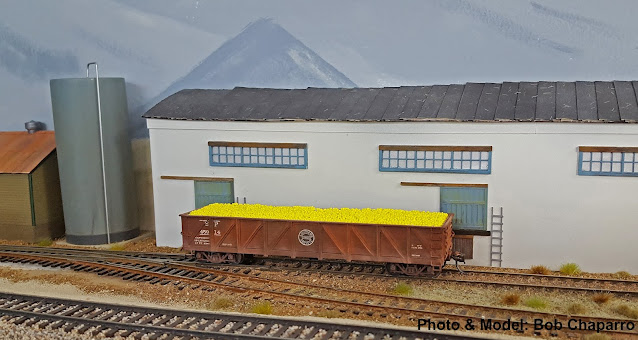Modeling Project: Second Cull Lemon Load In A Gondola
An article on prototype gondolas for transporting lemons was
posted on the Railroad Citrus Industry Modeling Group in 2018:
The article kindled my interest in building an HO scale
gondola with a cull lemon load. I reported on this project last year:
I followed up that project with a second gondola from Red
Caboose/Intermountain. Model photos of the HO scale gondola:
http://www.owlmtmodels.com/lumber/OMM3004SP150143-D.jpg
Data, photos and a drawing of this car appeared in the
February 1984 issue of Mainline Modeler on Page 54.
I followed the same steps as with the first model, which
were to detail and weather the model. Unlike the first model (Accurail), this
was an R-T-R model.
I prepared the gondola as usual: Cleaned the truck journals
with a reamer, painted the truck frames and faces of the wheels, lubricated the
journals with Teflon, sprayed the gondola body with Tamiya TS-80 Flat-Clear and
weathered the car body and trucks with various PanPastel media.
The next step was to make a raised styrene base for the
load. This base was primed, painted yellow and given a coat of Tamiya TS-80
Flat-Clear.
For lemons I used my original stock of JTT Scenery Products
#92124 miniature fruit, which included a packet of lemons. JTT now is owned by
Model Rectifier Corporation (MRC), who markets this product as JTT #0592124.
Be advised that these may be the only lemons available in HO
scale. Woodland Scenics did not offer scale lemons and neither did Alpine
Division Scale Models. Both of these companies no longer offer scale fruit of
any kind. In fact, Alpine Division Scale Models no longer is in business.
For lemons your best source is E-Bay for the old JTT stock
or MRC.
I coated the base with Pacer Technology's Formula 560 Canopy
Glue and sprinkled on some lemons. Adhesion was good. When dry I gave the first
layer another coat of Canopy Glue and added more lemons. I added a third coat
just for insurance. This produced a good, built-up layer of lemons with no bare
spots showing through to the base.
When this was dry, I shook off the excess. The load looked
fine so it was placed in the car. Done.
The photo below is the finished model temporarily parked on
a siding next to a scratch-built shallow relief model of the Corona Citrus
Association Packing House, which still stands. This packing house would not
have processed cull lemons so this car is awaiting transfer to the nearby
Exchange Lemon Products Plant, which on my railroad probably never will be
modeled.

No comments:
Post a Comment